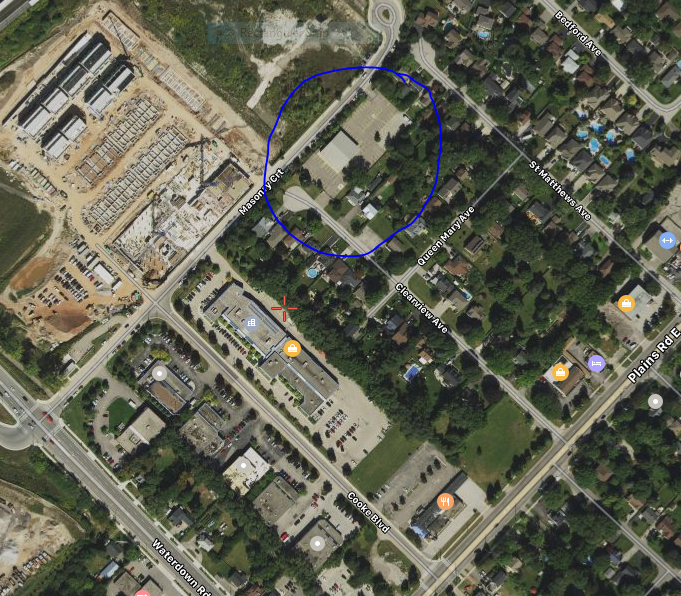The City of Burlington has lost an important appeal on a planning matter related to intensification and parking in Aldershot.
The Local Planning Appeals Tribunal (LPAT) ruled late Friday that a new development near the Aldershot GO Station is not required to provide as much parking on-site as the city and the neighbours wanted.
The Tribunal’s decision related to two seven-storey residential buildings soon to be constructed on Masonry Court.
The developer proposed 181 parking spaces, but the city wanted 205 in order to reduce the possibility of on-street parking on nearby residential streets.
The Tribunal accepted the developer’s position. “The reduced parking will encourage the use of public transit and other active transportation modes and will also reduce the cost of construction.”
The ruling is the latest blow to the nearby residents of Queen Mary, St. Matthew’s and Clearview avenues who opposed the two seven-storey buildings from the beginning. They were overruled by city council, but continued to oppose the reduced parking supply.
In a larger sense, the ruling touched on the city’s approach to intensification, pointing out that reduced parking in residential areas around GO stations is an accepted part of the long-term vision. It implied that Burlington could not simply ignore approved planning principles, goals, and objectives designed to achieve that vision.
“The City’s Official Plan policies support reduced reliance on vehicles and reduced parking standards,” quoted the decision.
It said that according to the provincial growth plan, “development will be supported, where appropriate, by providing development standards, such as reduced parking standards” around GO stations.
The hearings officer added that the Halton Regional Official Plan also encourages “local municipalities to adopt parking standards and policies within intensification areas to promote the use of active transportation and public transit.”
The ruling observed that the city’s parking bylaw does not include unique parking standards for intensification areas like GO stations and that “the City has not undertaken any further parking study work in this regard.”
The city had argued that the neighbourhood is in fact not yet intensified. It is still suburban in nature and quite dependent on cars. The higher parking rate is therefore required until the community transitions toward a larger population, more services within walking distance, and, ultimately, less dependence on cars. This was described as a “chicken and egg” scenario. Increased population and services should come first and then reduced parking rates — not the other way around.
The hearings officer disagreed: “The Tribunal considered the analogy in respect to ‘the chicken and the egg’ and finds that for the City to implement the Official Plan policies, it is necessary to take a step forward. …The conservative parking standard recommended by the City does not represent a step forward and will not result in an evolution of transit supportive intensification.”
“The Tribunal finds that the surrounding area meets the current needs of the community and accepts that, as the population increases as a result of intensification, services will increase to match the demand. The Tribunal finds that in order to achieve the goals and objectives of the City OP, the ROP and provincial plans it is necessary to take a step forward. The proposed parking rate is supported and taking a conservative approach will frustrate progress in respect of achieving these goals and objectives.”

Site of new development across the street from Aldershot GO Station

Approved seven-storey residential buildings to be located on Masonry Court



